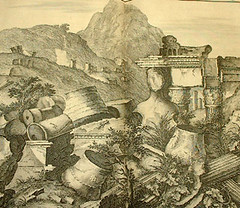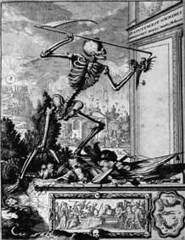[Youtube=www.youtube.com/v/OAkfHShATKY]
Monthly Archives: June 2007
Import Export
A film by Austrian director Ulrich Seidl (Hundstage, 2001) I’d like to see:
Two individual fates move in opposite directions. Olga, a nurse from the Ukraine, abandons her family to look for a better life in the West and ends up working as a cleaning woman in a geriatric ward in Austria. Paul, an unemployed security guard from Vienna, is looking a reason to get up in the mornings and heads East with his stepfather, ending up in the Ukraine. Two young people on the move, eager to start a new life, confronted with a rough reality. Two stories about the pursuit of happiness and material advantages, about the darker sides of sexuality and death, and about the difficulties of cleaning the teeth of a stuffed fox. —- festival-cannes.fr, still
Eurotrash philosophy
In a controversial article titled An Oasis in the Desert of Eurotrash Philosophy published in the The Chronicle of Higher Education of January 23, American literary critic Carlin Romano praises Pierre Hadot and lambasts European philosophers for their views on 9/11:
- “In the infancy of the 21st century, Eurotrash philosophers give European philosophy a bad name. Like Eurotrashers at trendy clubs, the philosophical species lives for the moment, spouts from the top of its careerist head, and makes little sense.
- …We think of Jean Baudrillard, the Eurotrash patron saint, a man whose mastery of argument falls somewhere between that of Kim Jong Il and the Raelians, and his ugly, exploitative little 9/11 “book,” The Spirit of Terrorism (Verso Books, 2002).
- …We think of the laughable French “urbanologist” Paul Virilio, whose works read as if a nasty wind blew his notes in the air, then haphazardly bound them into a book. (Ground Zero, Verso Books, 2002).
- …Of course, you don’t have to be French to be a Eurotrash philosopher. Consider Slovene Slavoj Zizek, the Roberto Benigni of corrupt intellectual discourse, a tiresome court jester always happy to walk across the chairs of any American university willing to meet his salary demands. To this often English-challenged jet-setter, in his Welcome to the Desert of the Real (Verso Books, 2002), the collapse of the WTC towers was “the climactic conclusion of 20th-century art’s ‘passion for the Real,'” and “the uncanny satisfaction we got from it was jouissance at its purest.” —Carlin Romano, An Oasis in the Desert of Eurotrash Philosophy, The Chronicle, January 2003
Numbers
[Youtube=http://www.youtube.com/watch?v=D8tOpHKPYGk]
Nice re-interpretation of Numbers by a girl named BeuzitaBrocolis.
Aaahhhhhhhhhh!
The Museum Tinguely presents the most extensive exhibition hitherto on the Situationist International that was founded on July 28, 1957. On the occasion of the 50th anniversary of its foundation, 400 exhibits will illustrate this last important avant-garde movement that counted 72 artists among its members, with sections in Germany, Holland, America, North Africa and elsewhere, rescuing it from oblivion.
More visuals of the book here.
The title of the exhitibion, In girum imus nocte et consumimur igni is a 1978 French language film by Guy Debord. This film, which was meant to be Debord’s last one, is largely autobiographical but begins with a thorough and pitiless critique of the spectator.
The title of the movie is a palindrome known as “the Devil’s verse.” It is Latin for “We enter the circle at night and are consumed by fire”, and was said to describe the behavior of moths. It is likely from medieval rather than ancient times.
Sex beats
[Youtube=http://www.youtube.com/watch?v=LXiAMfjybx4&]
“Yesterday in 1981, Gun Club released their debut single, “Sex Beat“. It was backed by “Ghosts On The Highway“. Both songs appeared on their debut album, Fire of Love. The Los Angeles band went through numerous personnel changes. At various points in their career, they had Patricia Morrision (ex-The Bags, later Sisters Of Mercy and The Damned), Rob Graves (ex-The Bags, future 45 Grave), Terry Graham (ex-The Bags) and Kid Congo Powers (future The Cramps).” On this date in 80s music history.
Liebestod
[Youtube=http://www.youtube.com/watch?v=3dfbZ6S6DU4]
Liebestod (German, “Love’s Death”) is the title of a song from the opera Tristan und Isolde by Richard Wagner.
As a literary term liebestod (from German Liebe, love and tod, death) it refers to the literary theme of erotic death or love death meaning the two lovers’ consummation of their love in death or after death.
Two-sided examples include Tristan und Isolde, Romeo and Juliet and to some degree Wuthering Heights, one-sided examples Porphyria’s Lover and The Sorrows of Young Werther.
The joint suicide of Heinrich von Kleist and lover Henriette Vogel is often associated with the liebestod theme.
That lifting of the gaze outwards
[Youtube=http://www.youtube.com/watch?v=nUDIoN-_Hxs]
” It is all over the place… but if you haven’t seen this, you should. It was the shift into the Mona Lisa right there at the beginning, that lifting of the gaze outwards, that set the hook for me.” The Laughing Bone via [1]



